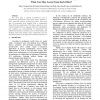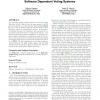13457 search results - page 12 / 2692 » Can we elect if we cannot compare |
JSS
2008
13 years 7 months ago
2008
Missing data is a widespread problem that can affect the ability to use data to construct effective prediction systems. We investigate a common machine learning technique that can...
INTR
2006
13 years 7 months ago
2006
Abstract. Typically each voter contributes with one vote for an election. But there are some elections where voters can have different weights associated with their vote. In this p...
WDAG
2010
Springer
13 years 5 months ago
2010
Springer
Leader election and arbitrary pattern formation are fundammental tasks for a set of autonomous mobile robots. The former consists in distinguishing a unique robot, called the lead...
HICSS
2009
IEEE
14 years 2 months ago
2009
IEEE
For more than a decade e-Commerce and eGovernment applications have made major impacts in their respective sectors, private and public. Some time ago, we presented early insights ...
CCS
2007
ACM
14 years 1 months ago
2007
ACM
The electronic voting machines known as Direct Recording Electronic (DRE), that are used in many states in the US have been shown to contain security vulnerabilities [16, 9, 3]. O...


